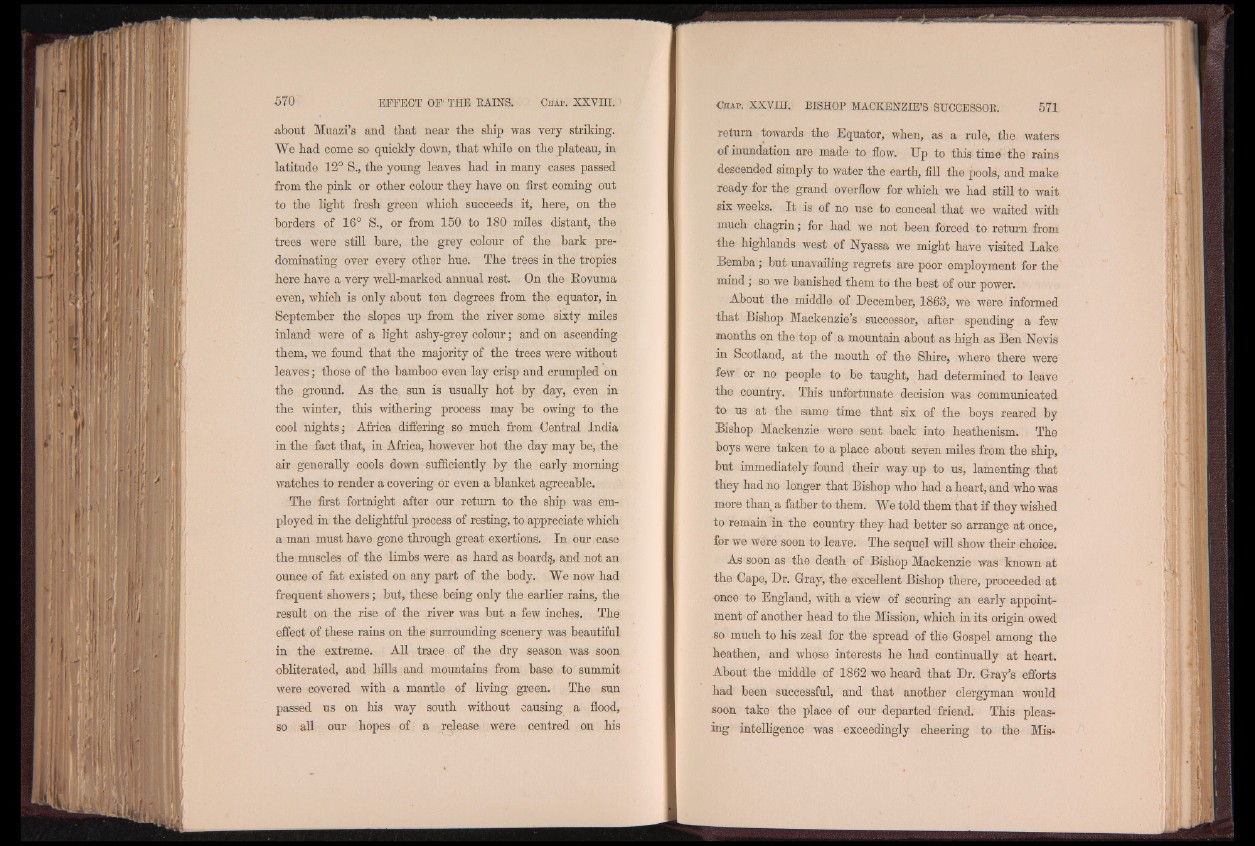
about Muazi’s and. that near tbe ship was very striking.
We had come so quickly down, that while on the plateau, in
latitude 12° S., the young leaves had in many cases passed
from the pink or other colour they have on first coming out
to the light fresh green which succeeds it, here, on the
borders of 16° S., or from 150. to 180 miles distant, the
trees were still bare, the grey colour of the bark predominating
over every other hue. The trees in the tropics
here have a very well-marked annual rest. On the Bovuma
even, which is only about ten degrees from the equator, in
September the slopes up from the river some sixty miles
inland were of a light ashy-grey colour; and on ascending
them, we found that the majority of the trees were without
leaves; those of the bamboo even lay crisp and crumpled on
the ground. As the, sun is usually hot by day, even in
the winter, this withering process may be owing to the
cool nights; Africa differing so much from Central India
in the fact that, in Africa, however hot the day may be, the
air generally cools down sufficiently by the. early morning
watches to render a covering or even a blanket agreeable.
The first fortnight after our return to the ship was employed
in the delightful process of resting, to appreciate which
a man must have gone through great exertions. In our case
the muscles of the limbs were as hard as boards, and not an
ounce of fat existed on any part of the body. We now had
frequent showers; but, these being only the earlier rains, the
result on the rise of the river was but a few inches. The
effect of these rains on the surrounding scenery was beautiful
in the extreme. All trace of the dry season was soon
obliterated, and hills and mountains from base to summit
were covered with a mantle of living green. The sun
passed us on his way south without causing a flood,
so all our hopes of a release were centred on his
return towards the Equator, when, as a rule, the. waters
of inundation are made to flow. TTp to this time the rains
descended simply to water the earth, fill the pools, and make
ready for the grand overflow for which we had still to wait
six weeks. I t is of no use to conceal that we waited with
much chagrin; for had we not been forced to return from
the highlands west of Nyassa we might have visited Lake
Bemba; but unavailing regrets are poor employment for the
mind; so we banished them to the best of our power.
About the middle of December, 1863, we were informed
that Bishop Mackenzie’s successor, after spending a few
months on the top of a mountain about as high as Ben Nevis
in Scotland, at the mouth of the Shire, where there were
few or no people to be taught, had determined to leave
the country. This unfortunate decision was communicated
to us at the same time that six of the boys reared by
Bishop Mackenzie were sent back into heathenism. The
boys were taken to a place about seven miles from the ship,
but immediately found their way up to us, lamenting that
they had no longer that Bishop who had a heart, and who was
more than a father to them. We told them that if they wished
to remain in the country they had better so arrange at once,
for we were soon to leave. The sequel will show their choice.
As soon as the death of Bishop Mackenzie was known at
the Cape, Dr. Gray, the excellent Bishop there, proceeded at
■once to England, with a view of securing an early appointment
of another head to the Mission, which in its origin owed
■so much to his zeal for the spread of the Gospel among the
heathen, and whose interests he had continually at heart.
About the middle of 1862 we heard that Dr. Gray’s efforts
had been successful, and that another clergyman would
soon take the place of our departed friend. This pleasing
intelligence was exceedingly cheering to the Mis